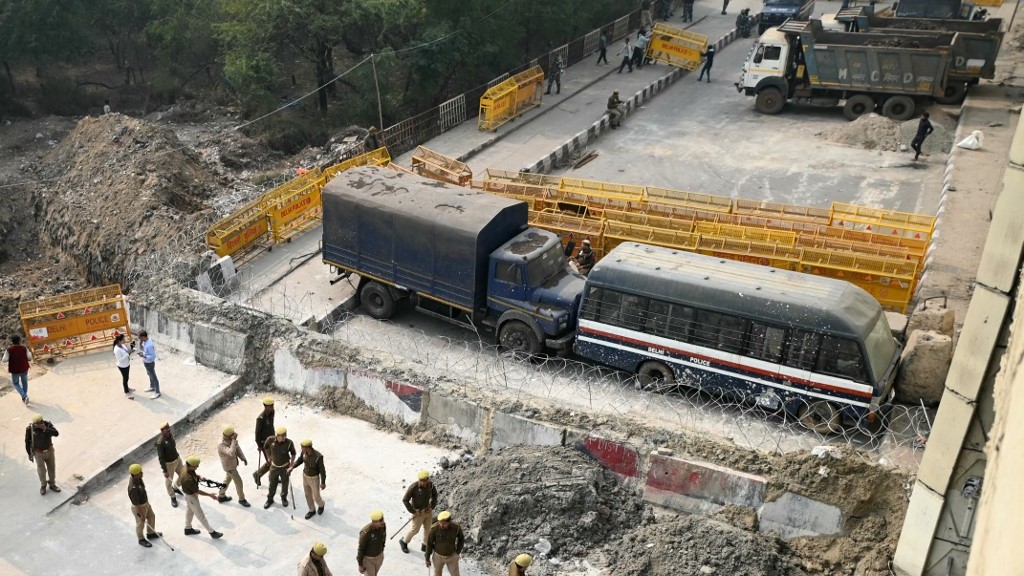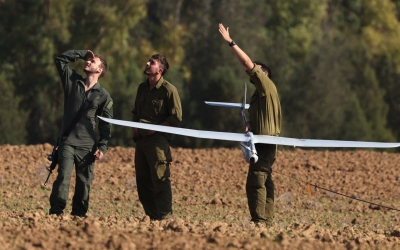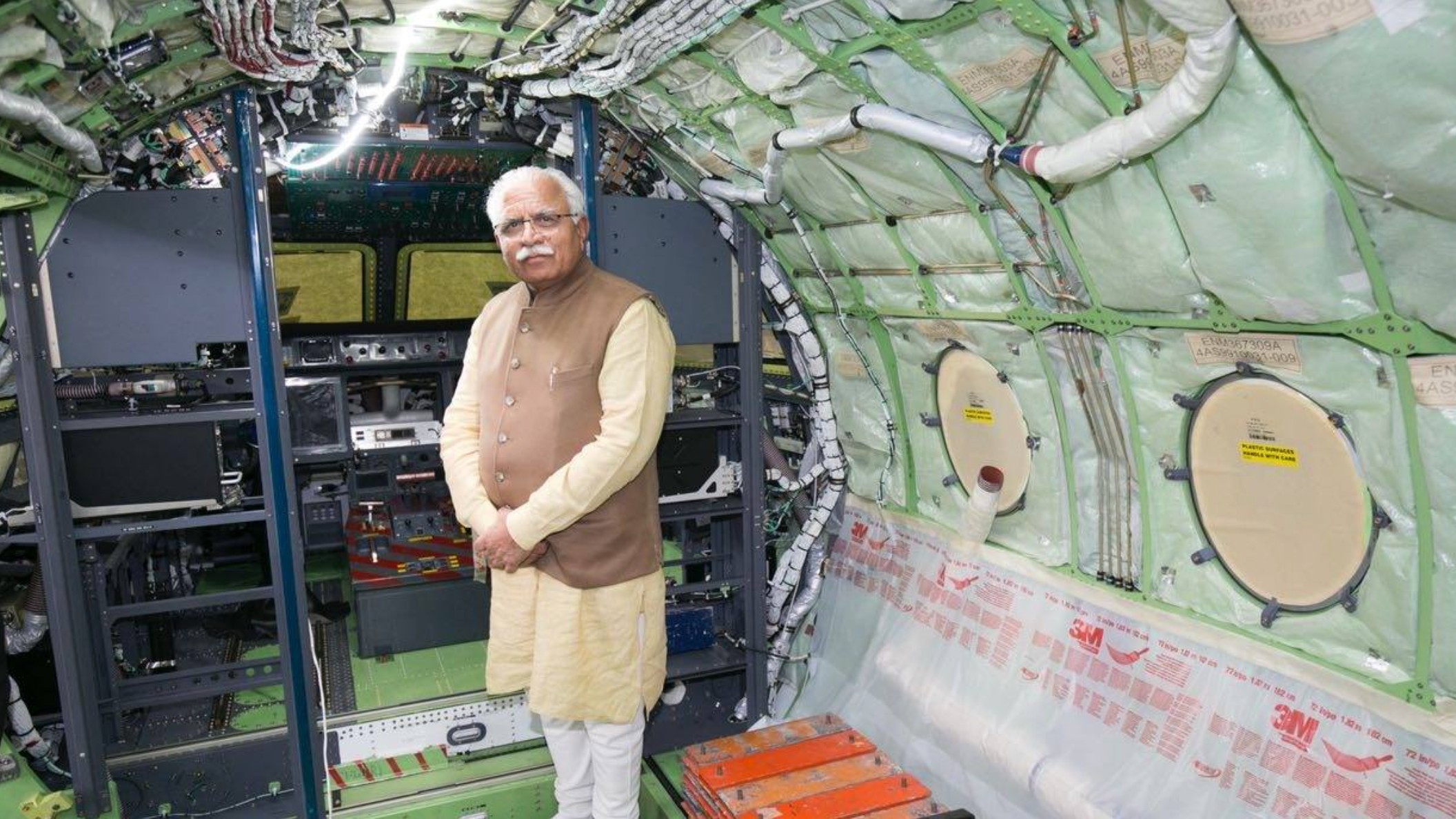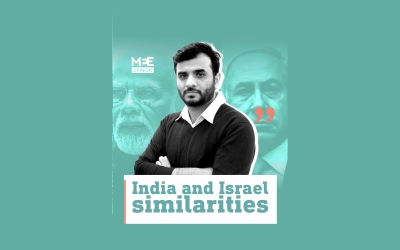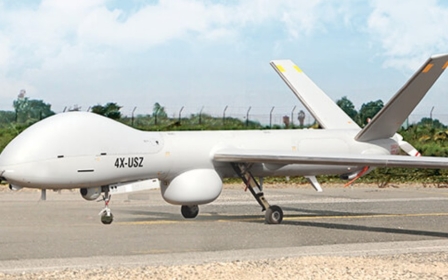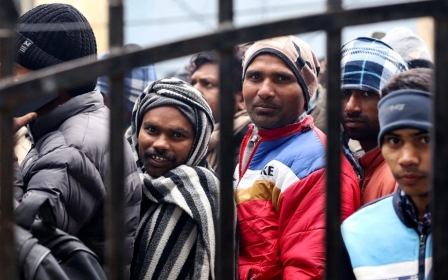Learnt from Israel, Indian forces deploy drones against protesting farmers
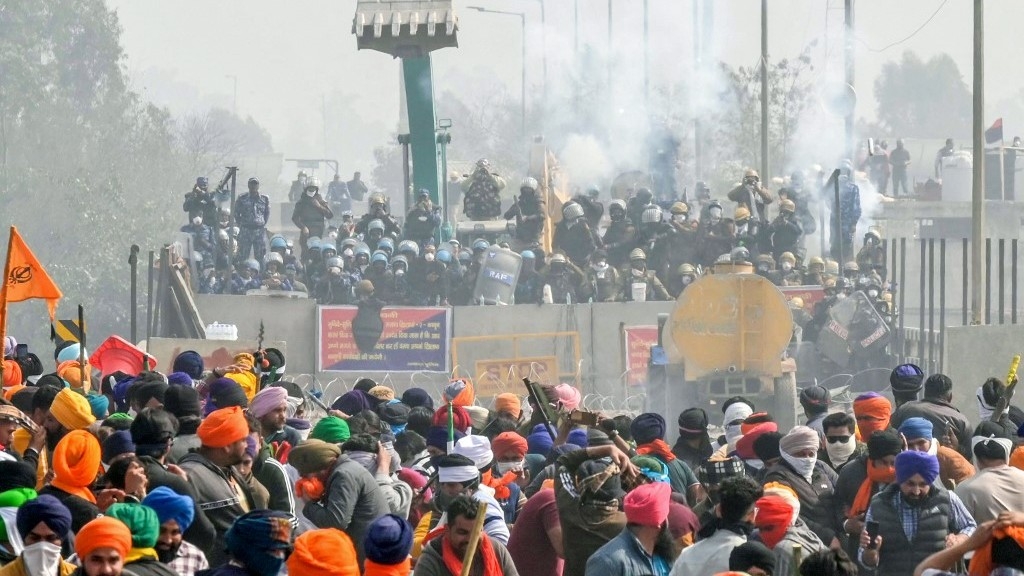
An Indian state government's decision to use drones to fire tear gas at farmers demanding better crop prices was influenced by the chief minister's visit to Israel during the 2018 Great March of Return protests, Middle East Eye can reveal.
According to state policy documents, statements and press materials seen by MEE, the chief minister of Haryana government, Manohar Lal Khattar, and his administration, have spent the past six years trying to replicate Israeli police and army tactics within Haryana state.
Last week, Indian forces sparked outrage by using drones to fire tear gas at farmers attempting to march from the states of Punjab and Haryana to India's capital, New Delhi.
The farmers, who are renewing a movement that succeeded in getting contentious agricultural laws repealed in 2021, have been calling on the government to guarantee minimum prices for around two dozen crops to help stabilise falling incomes.
The farmers have also been incensed at the government's decision to rescind their promise to waive loans.
New MEE newsletter: Jerusalem Dispatch
Sign up to get the latest insights and analysis on Israel-Palestine, alongside Turkey Unpacked and other MEE newsletters
Police in the state of Haryana, some 160km northwest of New Delhi, had initially unfurled barbed wire on roads, set up concrete barriers and wedged large police vehicles to deter farmers from marching on the capital, but on 8 February they warned they would use drones to identify any so-called agitators among the protesters.
Police also warned that taking part in the protests could result in the farmers having their passports revoked.
The situation escalated drastically on 13 February when talks between the farmers and the government broke down and paramilitary officers used drones to fire tear gas at the protesters, resulting in hundreds of injuries.
According to reports, Indian forces also fired lead-based pellets on to the protesters. Three farmers were declared permanent blind after they were struck with pellets in the face and forehead. It is unclear whether Haryana Police or paramilitary forces were responsible for the pellet injuries.
'Israel's treatment of Palestinians serves as a beacon of inspiration for proponents of oppressive policing'
- Somdeep Sen, Roskilde University
One farmer in Haryana, who was present at the protests and asked to be identified by his first name only, described as Haryana as having become "a ruthless place".
"We are not aware of relations between Israel and Haryana, but we know Haryana has become very oppressive for its people even using drones to drop toxic gases on old farmers," Inderjeet told MEE.
Another farmer, Sanjud Singh, who witnessed others being injured by tear gas shells that had been dropped from the drones, said there were many young farmers who refused to seek treatment over fears they would be picked up by authorities at hospitals.
"We are being treated as criminals. We are just raising voices for our dignity and livelihood. Look at the interstate border. The heavy forces with so many weapons.
"This government is using all tactics to silence us but the more they try to silence us the more our voices will become louder."
As the mayhem played out in Haryana, Delhi police travelled to Haryana last week to study the tactics used by the Haryana police.
And earlier this week, it was reported that the Delhi police had ordered 30,000 tear gas canisters as it prepared for protesters to continue with their march.
Replicating Israel
MEE has uncovered that the Haryana police department's use of drones to both create a database of protesters and launch tear gas were directly informed by a visit by the Haryana's chief minister along with a delegation of senior police officials to Israel in 2018.
The visit, which took place in May 2018 - during the Great March of Return protests - saw Haryana officials meet with Israeli intelligence, police officials as well as with Israel's Aerospace Industries executives.
That month was one of the deadliest for Palestinian protesters with 73 Palestinians killed by Israeli forces during that month - 68 of them on 14 May - and 6,000 injured.
'We have studied their system in detail. We will prepare a report and submit it to the state government so that such system can be replicated in Haryana'
- Anil Kumar Rao, head of Haryana's CID
Over the course of the 22-month long protests, some 214 Palestinians were killed, including 46 children, and more than 36,100 Palestinians were injured, among them 8,800 children.
The prolonged protests also saw Israeli forces use drones for the first time to fire tear gas at the Palestinians.
According to one report from the time, Indian officials had looked to Israeli intelligence agency Mossad to "sharpen" the state's police "intelligence-gathering skills" about handling uprisings and agitations.
Several delegates with state's security apparatus, including Khattar, said they would be looking to "replicate" Israel's tactics in Haryana.
"The idea behind the visit of police delegation is to learn from Israeli experts how to improve efficacy and efficiency of the law- and-order machinery to check crime and beef up security and intelligence network of the Haryana Police," the Chief Minister's office said in a statement at the time.
The team is also exploring availability of latest technologies which could be introduced in Haryana to further improve security and the law-and-order situation in the state," Khatter's office, added.
On their return to India, Haryana police officials said the visit had helped them learn new techniques to "enhance security and intelligence."
Later, Anil Kumar Rao, head of Haryana's Criminal Investigation Department (CID), announced that Haryana would prepare a databank of suspects' faces and voices, as they had seen in Israel.
"Israel is a small country. Its area is half that of Haryana. But the country's advancement in technology in internal security is par excellence," Rao, who had also been part of the delegation, said.
"We have studied their system in detail. We will prepare a report and submit it to the state government so that such system can be replicated in Haryana."
Three years later, the chief minister, Khattar, created the Drone Imaging and Information Systems of Haryana (Driishya) as means to accelerate the state's drone programme.
The public limited company, described as the first of its kind in India, was set up to provide authorities with the imaging to support infrastructural projects, forest protection, as well crowd monitoring.
Whereas the other senior police officers who went to Israel in 2018 have since been moved to higher positions within the Haryana security establishment, Khattar is still the chief minister as well as the chair of Driishya.
On 13 February, when the farmers began their long march to Delhi, Driishya is reported to have been the firm that provided the drones to the Indian paramilitary forces.
Clifton D'Rozario, the national secretary of the All India Central Council Trade Unions (AICCTU), told MEE that the technological relationship India has with Israel, particularly on surveillance, and the controlling of dissent, is veering "in a very dangerous direction".
"It is of great concern for everyone. It is a military state in the making. And the way it has been used this time, so brazenly, on farmers, in the open, without any fear, it means the stepping up to a kind of police state," D'Rozario added.
Somdeep Sen, an associate professor of International Development Studies at Roskilde University, in Sweden, agreed, telling MEE that "there has been - in general - a globalisation of a brand of policing that isn’t driven by an urge to serve and protect; rather the goal is to surveil and suppress."
"Here Israel has been a frontrunner - not just because it has actively exported this brand of policing around the world in places like India and the US," Sen said.
"Also, as has been evident from testimonies of its 'clients', like the senior leadership in Haryana police, Israel’s policing of Palestinians is also very inspirational to police around the world who too hope to surveil and suppress dissidents, minorities and other marginalised communities.
"Israel's treatment of Palestinians serves as a beacon of inspiration for proponents of oppressive policing globally," he added.
The use of the drones as method to clamp down on protests comes just weeks after it was revealed that Indian-made combat drones - produced in partnership with Israeli's Elbit Systems - had made their way to the Israeli army and were likely to be used in Gaza.
It also comes as India prepares to send thousands of workers to Israel to replace Palestinian workers who have had their permits revoked since the Hamas-led attack of 7 October. Haryana has also emerged as a key hub for the recruitment of Indian workers to Israel.
Under Chief Minister Khattar, Haryana has actively sought to brand itself as an entrepreneurial and energetic tech hub for defence and weapon manufacturers. Haryana is home to India-Israel Innovation Hub, that promoted collaboration between India-Israeli tech start-ups and professionals.
"The goal of the HUB is to create a highly developed hi-tech community in Delhi area and to create a productive ecosystem of Israelis and Indians with high technical capabilities," a policy document from the Haryana state government reads.
During his visit to Israel in May 2018, Khattar travelled to the Israeli Aerospace Industry (IAI) headquarters in Lod where he was reportedly briefed by Israeli officials about the innovations in aerospace and defence.
Khattar also visited a drone and jet manufacturing plant and invited IAI to set up units in the proposed Hisar Aviation Hub that is being currently built in Haryana.
He also urged Israeli cyber security firms to set up their bases in his state. According to Naor Gilon, Israel's ambassador to Delhi, the majority of Israeli investments in India were located in Haryana.
The state government envisages the Hisar hub as an aviation manufacturing and defence production node as a means to cater to global demands in the aviation sector.
Sen says that the direct tie up between Haryana and Israel was a reminder of the role Israel played in the political economy of war-making and policing.
"Much of the impunity Israel enjoys in its oppression of Palestinians is a consequence of this. Israel is well aware of this and plays an active role in finding a global market for its war machines and policing techniques. It is also a disturbing reminder how Israel is implicated in the sustenance of illiberal politics the world over," Sen added.
Over the past two decades, India and Israel have become strong military partners with Israel's weapon sales to Delhi worth more than $1bn per year.
The Indian federal government, particularly since Narendra Modi became prime minister, has also made no bones of their admiration for Israeli tactics as well as their plans to replicate Israeli methods in highly contested areas like Indian-occupied Kashmir.
"Last summer, Haryana witnessed extreme and well-orchestrated violence against Muslims while the police looked on. It was perpetrated by the killer gangs of the Bajrang Dal who, like the Israeli settlers, are violent non-state actors," Amrit Wilson, an Indian activist with the South Asia Solidarity Group (SASG), base in London, told MEE.
"It was followed by the bulldozing of Muslim homes and properties with the same JCB bulldozers as used in Palestine."
Defence analysts say the partnership with India could ultimately result in both the mass production as well as in the wider distribution of Israeli weapons.
MEE reached out to the Haryana Police Department and the chief minister's office for comment but did not receive a response by time of publication.
Additional reporting by a MEE correspondent in New Delhi.
Middle East Eye delivers independent and unrivalled coverage and analysis of the Middle East, North Africa and beyond. To learn more about republishing this content and the associated fees, please fill out this form. More about MEE can be found here.


